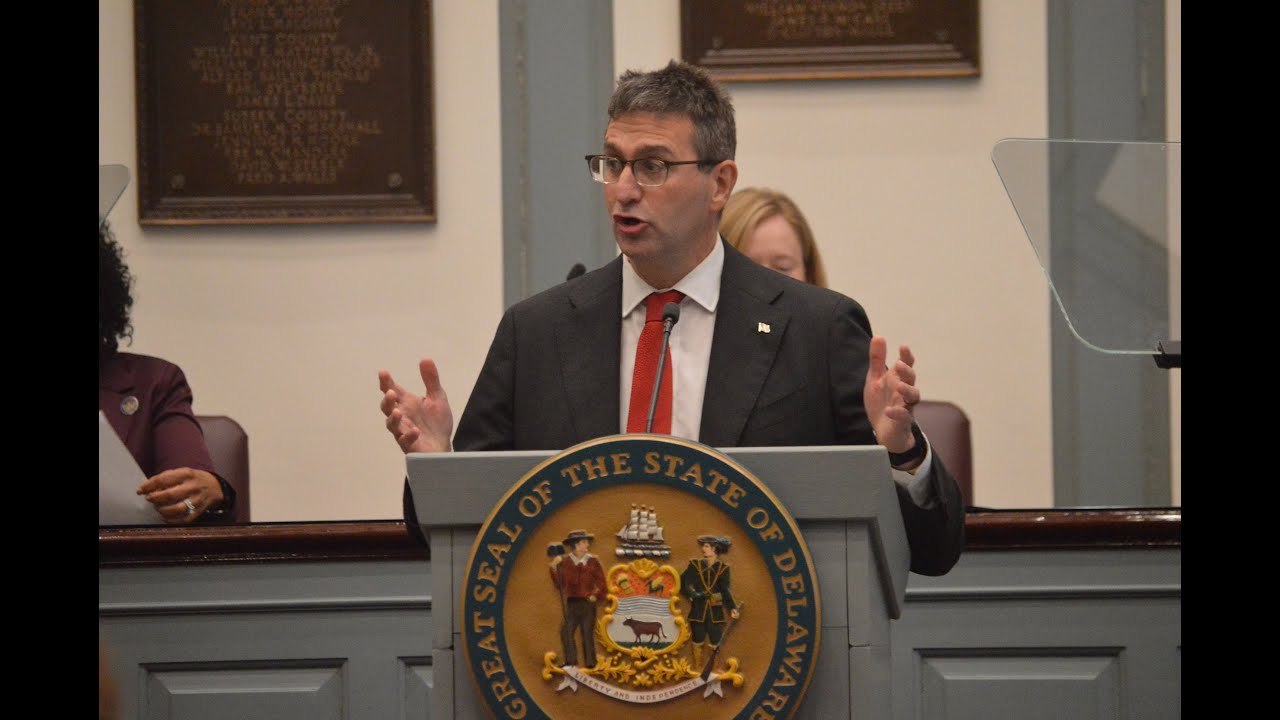Politics
Delaware Governor Seeks Marijuana Regulation Advice From Colorado Counterpart As State’s Legal Market Launches

The governor of Delaware says he’s still weighing the pros and cons of a bill that would overrule local zoning authority on marijuana and make it easier for cannabis businesses to set up shop—but he’s pledging that action on the legislation will happen “very shortly.”
During an interview with Delaware Public Media, Gov. Matt Meyer (D) also discussed a conversation he had with Colorado Gov. Jared Polis (D) about regulating the marijuana industry, drawing a contrast between their respective responsibilities given the fact that Colorado is much larger with more local jurisdictions to interact with compared to Delaware, which has just three counties.
Delaware’s adult-use cannabis market launched at the beginning of this month, but legislation awaiting Meyer’s action would make a key change related to local control of where marijuana businesses could operate. And the governor has indicated he’s still wavering on the proposal.
Asked about the fate of the bill from Sen. Trey Paradee (D), who also championed the state’s legalization legislation, Meyer said: “Stay tuned. You’ll hear soon. We will be taking action very shortly.”
“Listen, I have local government background. I don’t think it’s appropriate that, when state government likes local government regulation, they say, ‘Yeah, we support it,'” the governor said. “And when they don’t like local government regulation, they overrule it.”
“At the same time, it’s important for communities that this moves forward,” he said, referring to the implementation of the adult-use cannabis market.
The response didn’t clearly indicate where Meyer currently stands on the proposal, but he also said it’s “always on the table” that he could allow the bill to take effect without his signature.
“I was talking to Governor Polis of Colorado about marijuana regulation just the other day and he’s just like, ‘Just let the counties do it.’ He has too many counties to know,” Meyer said. “I was asking, ‘What’s the regulation of counties?’ He’s like, ‘I have no idea.’ He’s like, ‘Some do it, some don’t. I don’t really know.'”
The Delaware Public Media host said: “But he’s not going to run into the problem, though, where if there’s enough zoning laws, there’s literally no place to put the facilities. That’s probably not a problem for him.”
The governor agreed, saying “Colorado is much larger” with a “three-mile [zoning] limitation from schools,” which would be less feasible in the smaller state of Delaware. “We’re going to see what we can do,” he said.
On the topic of broader regulatory responsibilities, Meyer said the state is “very lucky” that the Office of the Marijuana Commissioner (OCM) is headed up by someone who comes from outside of Delaware who is “one of the leading thinkers on this issue.”
“He looks at it from a business and community aspect, whereas traditionally Delaware has looked at it as a public safety issue,” the governor said. For his part, Meyer said revenue generated from cannabis taxes is “clearly third” on his list of reasons to support legalization.
The first priority, he said, is ensuring that “communities are sustainable and they’re safe and they’re protected.”
“I think there’s a lot of concern in communities. I have small children. What are we doing? Do we want this thing all around our kids? I don’t know how many of you have been to New York or San Francisco lately, but you go outside and there’s that stench,” he said. “That’s not Delaware. We’re doing everything to make sure that we continue to retain the same communities we have.”
“We also have a historic obligation. Marijuana and marijuana enforcement in this state has not been equitable. There are people in our communities today, almost all Black and brown people, who have been imprisoned for years and years for using and selling marijuana, where people of different colors of skin have not had that same experience. We need to make sure we use whatever revenue we have to address that historic wrong going forward.”
“We’re continuing to watch and monitor to make sure communities are being protected as this economic opportunity grows and make sure people are safe,” Meyer said.
While marijuana revenue might be “third” on his list, the governor recently touted the state’s first “successful” weekend of adult-use cannabis sales, with total purchases for medical and recreational marijuana totaling nearly $1 million—and compliance checks demonstrating that the regulated market is operating as intended under the law.
Delaware’s first adult-use marijuana shops officially opened for business on August 1, with a handful of existing medical cannabis operators able to service consumers 21 and older.
This comes about two years after marijuana legalization was enacted into law under former Gov. John Carney (D).
Ahead of the sales roll-out, the governor last month toured one of the state’s cannabis cultivation facilities, praising the quality of marijuana that’s being produced, which he said will be the “French wine of weed.”
The launch of the legal market comes amid some controversy, however, with critics alleging that allowing medical operators to start adult-use sales ahead of other license applicants is unfair. There’s also ongoing tension between state and local officials over who will ultimately control zoning rules for the new industry—a dispute that could have major implications for the rollout of future stores.
Dozens of other would-be retailers that have either already received licenses or are still awaiting issuance will need to wait for further regulatory approvals until they can open their doors—a situation that’s frustrated some advocates.
Meanwhile, two lawmakers who led the push to legalize marijuana are separately seeking input from consumers and businesses about the market launch. Paradee, the sponsor of SB 75, and House Majority Whip Rep. Ed Osienski (D)—the primary sponsor of the state’s 2023 legalization bills—put out a new online form this month for residents to share thoughts and feedback about the cannabis program anonymously.
The idea is to identify any hiccups that lawmakers might need to address when they return for next year’s legislative session.
OCM initially projected that recreational sales would start by March, but complications related to securing an FBI fingerprint background check service code delayed the implementation. Lawmakers passed a bill in April to resolve the issue, and the FBI subsequently issued the code that the stat’s marijuana law requires.
—
Marijuana Moment is tracking hundreds of cannabis, psychedelics and drug policy bills in state legislatures and Congress this year. Patreon supporters pledging at least $25/month get access to our interactive maps, charts and hearing calendar so they don’t miss any developments.
![]()
Learn more about our marijuana bill tracker and become a supporter on Patreon to get access.
—
Late last year, OMC held a series of licensing lotteries for cannabis business to start serving adult consumers.
A total of 125 licenses will ultimately be issued, including 30 retailers, 60 cultivators, 30 manufacturers and five testing labs. Last year, regulators also detailed what portion of each category is reserved for social equity applicants, microbusinesses and general open licenses.
Regulators have also been rolling out a series of proposed regulations to stand up the forthcoming adult-use cannabis industry.
Meanwhile, Carney raised eyebrows in January after making a questionable claim that “nobody” wants cannabis shops in their neighborhoods, even if there’s consensus that criminalization doesn’t work.
The then-governor last year signed several additional marijuana bills into law, including measures that would allow existing medical cannabis businesses in the state to begin recreational sales on an expedited basis, transfer regulatory authority for the medical program and make technical changes to marijuana statutes.
The dual licensing legislation is meant to allow recreational sales to begin months earlier than planned, though critics say the legislation would give an unfair market advantage to larger, more dominant businesses already operating in multiple states.
In October, Carney also gave final approval to legislation to enact state-level protections for banks that provide services to licensed marijuana businesses.
Delaware’s medical marijuana program is also being significantly expanded under a law that officially took effect last July.
The policy change removes limitations for patient eligibility based on a specific set of qualifying health conditions. Instead, doctors will be able to issue cannabis recommendations for any condition they see fit.
The law also allows patients over the age of 65 to self-certify for medical cannabis access without the need for a doctor’s recommendation.




